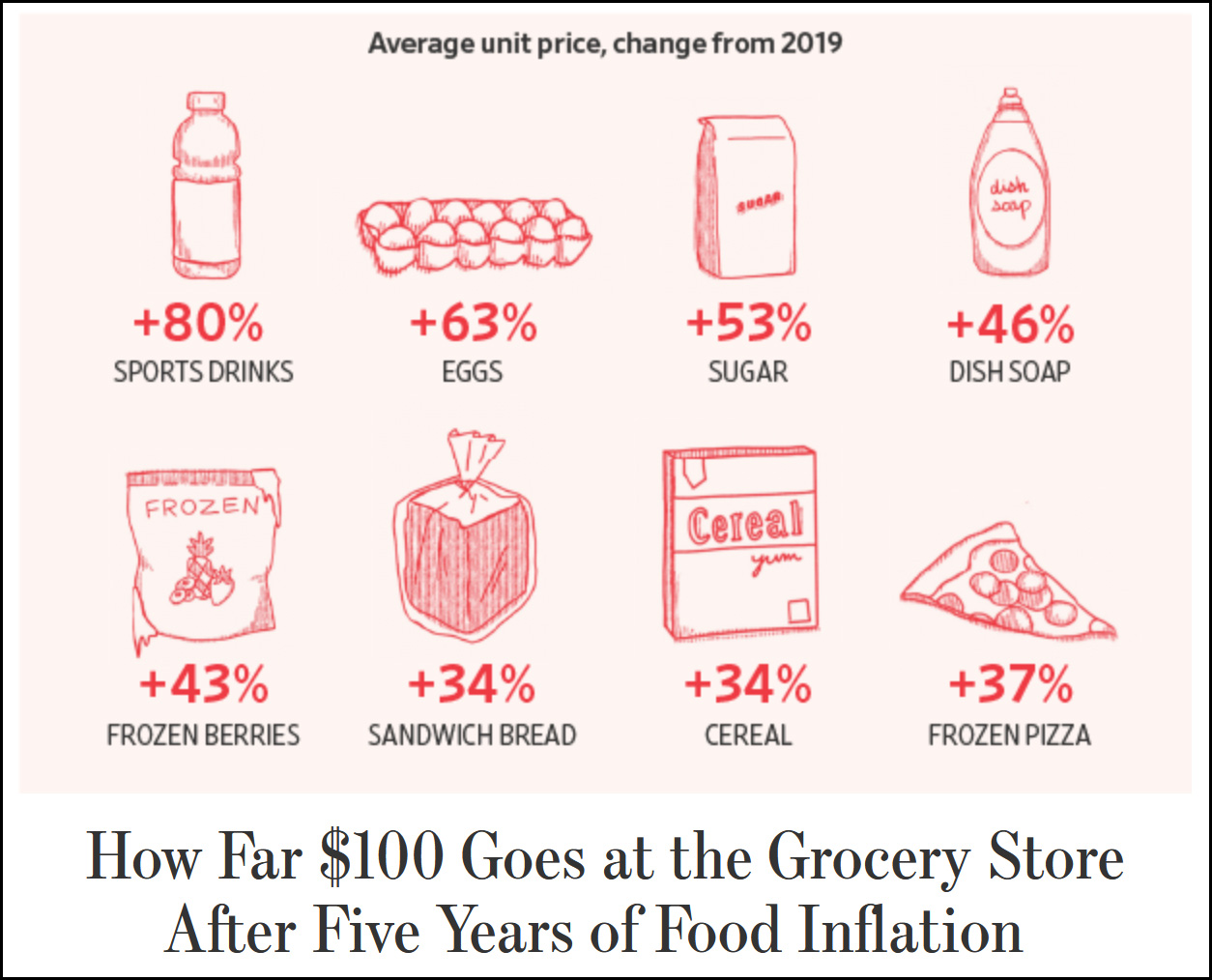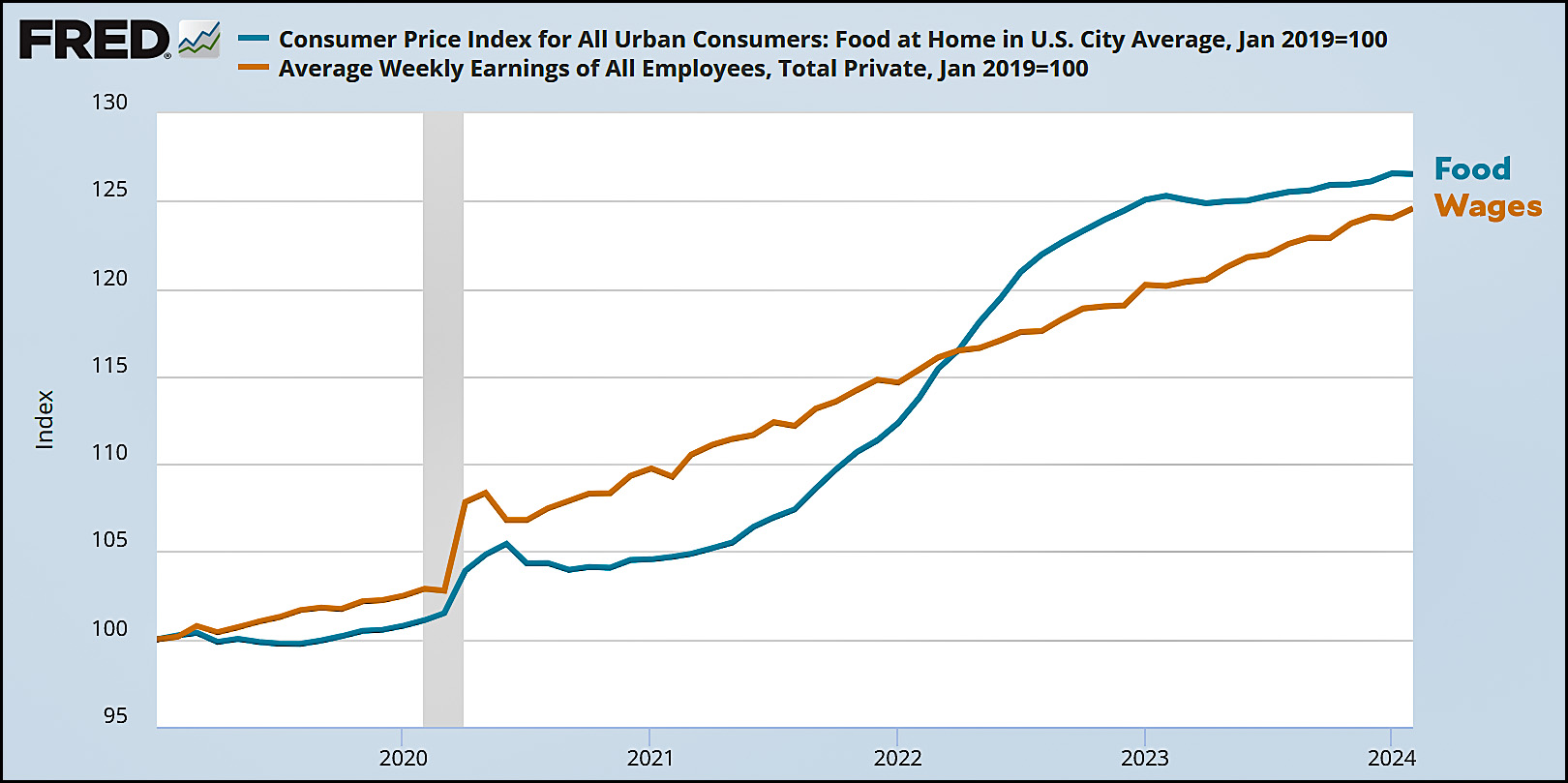I have perfect timing. Yesterday I noted that even though overall food inflation is low, there are still some items that have increased a lot. Today, the Wall Street Journal splashes this exact thing across their front page:
 "Calm down, Kevin," some of you are already saying. "Read past the headline and I'm sure they compare average food prices to wages. The Journal is a serious paper."
"Calm down, Kevin," some of you are already saying. "Read past the headline and I'm sure they compare average food prices to wages. The Journal is a serious paper."
Astonishingly enough, no. There is not so much as a mention of wages in the piece. In fact, they exaggerate food inflation by cherry picking a basket of items that have gone up more than average. Here's the real story:
 Since 2019, the overall cost of groceries has increased 1.5% more than average wages.
Since 2019, the overall cost of groceries has increased 1.5% more than average wages.
That's not a typo. 1.5%.
That's all but unnoticeable. And, I suppose, nowhere near scary enough for the front page of the Journal. They should be ashamed of themselves.

This is intentional. Being truthful might help Biden.
Cherry pick...wait, cherries aren't included!!! (have you ever seen a cherry in a bag of frozen berries?)
War and climate change are having a serious effect on food prices in general. A little warming, no big deal. But now the drought/flood combo around the world is hitting hard, and growing ranges are shifting.
and i'm guessing they didn't discuss profit margins until the last graf of the article
Kevin has it right, Not only have wages increased, but people holding cash have seen their holdings keep up with the price of food. Savings accounts have increased in value commensurate with inflation. Everybody should relax.
Re wages: the increase of *average* wages means that everybody experiences that increase. So no need to worry about irregular distribution of increases.
Kevin's world: only wages and all the same trajectory. Economics is easy!
If, instead of all employees, you use wages for production and non-supervisory employees, you'll find wages grew about 2% MORE than food prices.
Kevin doesn't get it right either. Since 2019 nominal wages have increased 25%, but GDP/capita (a form of productivity) has increased by 30%. This is not as bad as the difference at times in the past, such as the seventies and eighties when real wages actually fell considerably (that is nominal wages fell far behind nominal prices), but it is still an indication of increasing inequality.
Things have been this way for a long time, while before about 1973 wages were actually gaining on productivity and inequality was decreasing. Continued lack of gain for workers is certainly not due to Biden and there is no reason to think that Trump would cause things to change. In fact the trend was about the same during Trump's administration. There are many factors which have probably been responsible for the stagnation of real wages, but Republican or neoliberal economic policies must be among the main ones.
This may be correct but I bet it is not the point the Wall Street Journal intended to make...
"They should be ashamed of themselves."
If your business model depends on not being ashamed of yourself you won't be.
...and also, if there's a list of the things the WSJ should be ashamed of (if they cared), this miniscule propaganda piece is certainly not in the top 20.
The Jounal's numbers are clearly wrong and too low. There's a guy on Nextdoor that says his food bill has tripled. Who are you gonna believe?
One thing I think you are missing: if you haven’t switched jobs since the inflation burst, you are almost certainly behind. Major employers only boosted raises a percentage point or so above normal, nowhere near enough to keep up. Three years of 4.5% raises rather than 3.5% raises barely makes a difference.
Yes. Very true. I'm in that boat, but I'm also of an age where I'm weighing whether to retire this year or next. And, since I work from home, there is inspiration to be taken from the glorious motto of the valiant workers of the Soviet Union: "They pretend to pay us and we pretend to work."
Who owns the WSJ again? Oh, right.
Want to save money on sports drinks? Don't buy any.
And eggs are a situation with inflexible demand and no direct substitutions so if there is a supply problem the price goes way up. Econ 101.
Because our cheap eggs are laid by thousands of chickens with no genetic diversity held their whole lives in one building, a virus can decimate the whole thing. It happened recently and is happening again now. The price of eggs should not be included in any discussion of supermarket prices.
Shouldn't we be discussing median wages? It could be skewed to high earners.
Wages are only higher for those who changed jobs or work fast food in California. Food prices went up for everyone. Wages do not rise like food prices. When food manufacturing conglomerates raised prices on their goods, they did not concomitantly raise their labor force's wages, nor did most employers raise the wages of their staffs as a response to higher living costs.
I'm curious. Compare Social Security incomes vs. prices. I think there are around 70 million of us that certainly didn't see cost of living increases on our Social Security payments sufficient to keep up with price increases. Plus, a chunk of the increases in payments were taken up with increased Medicare payments, and every medical fee in sight.
Amen.